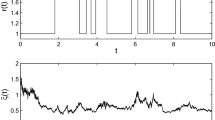Abstract
This paper presents a study on the problem of non-fragile state feedback H-infinity controller design for linear discrete-time systems with quantized signals. The quantizers considered here are dynamic and time-varying. With the consideration of controller gain variations and quantized signals at the same time, a new non-fragile H-infinity control strategy is proposed with updating quantizer’s parameters, such that the quantized closed-loop system is asymptotically stable and with a prescribed H-infinity performance bound. An example is presented to illustrate the effectiveness of the proposed control strategy.
Similar content being viewed by others
References
D. F. Delchamps. Stabilizing a linear system with quantized state feedback[J]. IEEE Transactions on Automatic Control, 1990, 35(8): 916–924.
H. Gao, T. Chen. A poly-quadratic approach to quantized feedback systems[C]// Proceedings of the 45th IEEE Confenrence Decision and Control. Piscataway: IEEE Press, 2006: 5495–5500.
N. Elia, S. K. Mitter. Stabilization of linear systems with limited information[J]. IEEE Transactions on Automatic Control, 2001, 46(9): 1384–1400.
M. Fu, L. Xie. The sector bound approach to quantized feedback control[J]. IEEE Transactions on Automatic Control, 2005, 50(11): 1698–1711.
R. W. Brockett, D. Liberzon. Quantized feedback statilization of linear systems[J]. IEEE Transactions on Automatic Control, 2000, 45(7): 1279–1289.
H. Ishii, B. A. Francis. Stabilizing a linear system by switching control with dwell time[J]. IEEE Transactions Automatic Control, 2002, 47(12): 1962–1973.
D. Liberzon. Hybrid feedback stabilization of systems with quantized signals[J]. Automatica, 2003, 39(9): 1543–1554.
G. N. Nair, R. J. Evans. Exponential stabilisability of finitedimensional linear systems with limited data rates[J]. Automatica, 2003, 39(4): 585–593.
S. Tatikonda, S. Mitter. Control under communication constraints[J]. IEEE Transactions on Automatic Control, 2004, 49(7): 1056–1068.
G. Zhai, Y. Mi, J. Imae, et al. Design of H∞ feedback control systems with quantized signals[C]//Proceedings of the 16th IFAC World Congress. Oxford: Elsevier Ltd., 2005: 1915–1920.
L. H. Keel, S. P. Bhatacharyya. Robust, fragile, or optimal[J]. IEEE Transactions on Automatic Control, 1997, 42(8): 1098–1105.
P. Dorato. Non-fragile controller design: an overview[C]// Proceedings of the 1998 American Contol Confenrence. Evanston: American Automatic Control Council, 1998: 2829–2831.
D. Famularo, C. T. Abdallah, A. Jadbabais, et al. Robust non-fragile LQ controllers: the static state feedback case[C]//Proceedings of the 1998 American Contol Confenrence. Evanston: American Automatic Control Council, 1998: 1109–1113.
W. M. Haddad, J. R. Corrado. Robust resillient dynamic controllers for systems with parametric uncertainty and controller gain variations[C]//Proceedings of the 1998 American Contol Confenrence. Evanston: American Automatic Control Council, 1998: 2837–2841.
W. M. Haddad, J. R. Corrado. Resilient dynamic controller design via quadratic Lyapunov bounds [C]//Proceedings of the 36th IEEE Conference on Decision and Control. New York: IEEE Press, 1997: 2678–2683.
G. Yang, J. Wang. Non-fragile H∞ control for linear systems with multiplicative controller gain variations[J]. Automatica, 2001, 37(5): 727–737.
G. Yang, W. Che. Non-fragile H∞ filter design with additive gain variations[C]//Proceedings of the 45th IEEE Confenrence on Decision and Control. Piscataway: IEEE Press, 2006: 4775–4780.
Author information
Authors and Affiliations
Corresponding author
Additional information
This work was partly supported by the Funds for Creative Research Groups of China (No.60521003), the State Key Program of National Natural Science of China (No.60534010), the Funds of National Science of China (No.60674021), the Funds of PhD program of MOE, China (No.20060145019) and the 111 Project (B08015).
Weiwei CHE is a Ph.D. candidate at the College of Information Science and Engineering, Northeastern University. Her research interests include non-fragile control and quantization control. Corresponding author of this paper.
Guanghong YANG is a professor at Northeastern University. His current research interests cover faulttolerant control, fault detection and isolation, and robust control. He is also a senior member of IEEE, an associate editor for the International Journal of Control, Automation and Systems (IJCAS), and an associate editor of the Conference Editorial Board of IEEE Control Systems Society.
Rights and permissions
About this article
Cite this article
Che, W., Yang, G. Non-fragile state feedback H-infinity control for discrete-time systems with quantized signals. J. Control Theory Appl. 7, 63–67 (2009). https://doi.org/10.1007/s11768-009-7091-9
Received:
Revised:
Published:
Issue Date:
DOI: https://doi.org/10.1007/s11768-009-7091-9




